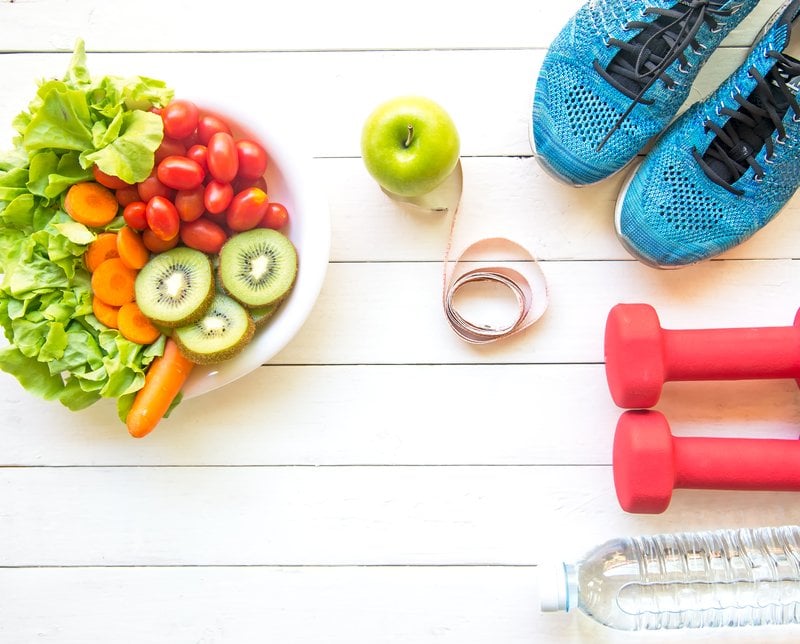How to Boost Your Immune System Naturally (10 Easy Tips)

If you’re like most people, you tend to think about your immune system only when there’s a “bug” going around the office, your community, or your kid’s school. You’ll likely give it even more attention after you “catch” something, and then, you’re highly interested in what you can do to boost your immune system to try to get well faster.
It’s worth noting, however, that a strong immune system doesn’t come from a single day’s diet or what you did last week. There’s no quick fix if your immune system isn’t up to snuff. Like most of the systems in the body, a healthy immune system is the product of what you do day in and day out. After all, it’s a highly complex system that requires balance and harmony. It’s also important to understand that even folks who have a strong, balanced immune system still get sick from time to time.
That doesn’t, however, mean there’s nothing you can do to boost your immune system. Rather, it’s encouraged to take good care of your immune system in good times as well as ill by using the immune system boosters below.
What is the Immune System?
When we think about the immune system, many of us travel back to elementary or middle school science where we learned about white blood cells. In case you need a refresher, these cells help the body fight infection and other diseases and include granulocytes, monocytes, and lymphocytes like T cells and B cells.
White blood cells are a critical part of the immune system, but it doesn’t stop there. Along with specialized fighter white blood cells, skin and bone marrow as well as other tissues and organs throughout the body, including the lymphatic system, tonsils, adenoids, spleen, thymus, and the digestive system, help protect against invaders.
Those invaders can include bacteria, parasites, and viruses that can cause infections. Another key role of the immune system is to tell the difference between our own cells and alien invaders (i.e., self vs. non-self). If the immune system gets confused, it can attack our own cells and cause all sorts of issues from allergies to autoimmune disorders. (But we’ll leave that for another discussion another time.) That’s why it’s more important to think of a healthy, balanced immune system rather than just an overpowering one. Like most things in the body, it’s all about balance.
What’s most important to remember is that the immune system has the very big job of protecting the body from infections that can lead to illness. And while we can certainly support and even boost the immune system, there are no quick, foolproof fixes.
So, How Can You Boost Your Immune System?
First off, don’t put it off. No matter how much (or how little) you think you’re at risk, having a balanced, robust, healthy, happy immune system is critical for a resilient, healthy, happy life. And even with a healthy immune system, it’s important to point out that it won’t keep you from ever getting sick. It will make you more likely to stay well, and in the event that you do “catch” something, a robust, properly functioning immune system will ensure you bounce back quickly and fully, and it will be intelligent enough to learn from experience—ready to combat future infection.
Having said that, here are 10 ways to balance and boost your immune system:
1. Practice healthy hygiene
Why not protect your body from invaders before they can invade in the first place? The best way to do this is with good, old-fashioned hand washing. If you’re out and about, hand sanitizers that have at least 60% alcohol are useful, but they don’t compare with handwashing with warm soap and water for at least 20 seconds. 1 Wash your hands after you cough or sneeze, before you eat, or before you touch your nose, eyes, or mouth. Because germs that cause infections can also live on doorknobs, keypads, and other surfaces that we regularly come into contact with, wash your hands after touching surfaces as well to help avoid infection.
While you’re at it, please practice the recommended social distancing and follow the other CDC recommendations to keep yourself and others safe. And avoid touching your face when you’re out in public.
2. Eat a healthy, whole-food-based diet
If you want to boost your immune system, then good nutrition is in order. In addition, there are certain foods that can support immunity. Here’s a list of nutrients to ensure are found in your fridge throughout the year to help fend off pathogens.
One important compound to look for is “phytonutrients” like flavonoids. These potent plant nutrients found in vegetables, fruits, nuts, seeds, and spices, have been shown in numerous research studies to support immunity. 2
Healthy fats, such as olive oil, are also important to naturally boost your immune system. 3 Omega-3 fatty acids from fatty fish like salmon and sardines as well as chia and hemp seeds have also been found to help support a healthy inflammatory response, which helps promote immune balance. 4
Protein, as found in seafood, lean meat, poultry, and nuts and seeds, is also a necessary macronutrient for a healthy immune system as amino acids are needed to build and maintain immune cells. 5
Even if you’re eating the “right foods,” you may not get the expected protection if you’re not eating enough. Those folks who suffer from undernutrition (which can happen not only with food shortages but also with restrictive diets) and micronutrient deficiencies can experience impaired immune function. Micronutrient malnutrition (which is more common with folks who are over 65) occurs when people don’t get the essential vitamins and minerals they need from their food and/or supplements often because of a lack of variety of foods.
So please be sure you’re getting enough calories along with a rainbow of nutrient-dense vegetables and fruits including apples, berries, oranges, tomatoes, beets, onions, cruciferous vegetables, and peppers as well as using a variety of herbs and spices. 6
You will also, however, want to avoid overeating, especially sweets and refined junk foods, as that can suppress the immune system. 7
3. Stay active and exercise regularly at moderate intensity
We may sound like a broken record, but there’s good reason that we recommend an active lifestyle on the regular. There are so many health benefits of regular exercise, and that includes boosting the immune system.
Moderate exercise has been associated with a decreased risk of illness and has been shown to help increase the defense activity of the immune system. 8 Even a single moderate bout of exercise has been found to boost the immune system. Exercise may improve immunity and healthy outcomes even for “at-risk” people such as the elderly, obese, and those living with chronic conditions. 9
However, you do want to avoid overdoing exercise as intense training and competition have been found to actually lower immunity and increase risk of illness in athletes.
Aim for at least 2.5 to 4 hours per week (or 30 to 40 minutes 5 to 6 days a week) of brisk walking, hiking, jogging, cycling, swimming, bicycling, or your favorite cardiovascular exercise along with strength training at least twice a week. (More activity is associated with even more health benefits, so feel free to add more, especially if you find exercise to be a great stress reliever.)
4. Practice healthy sleep hygiene
Quality sleep is essential for so many things, from maintaining a healthy weight to improving focus and clarity to enhancing performance to, you guessed it, improving immunity. According to research, folks who aren’t getting enough sleep are much more likely to catch a cold, with folks who slept less than five hours per night at the highest risk. 10 Aim to get at least seven hours of sleep per night.
5. Cut back on the booze.
Having a drink or two at the end of the day (i.e., moderate drinking) doesn’t appear to have a negative effect; in fact, moderate alcohol consumption may even have a slight positive effect on the immune system, as beer and wines are rich in polyphenols. That said, it is clear that excess alcohol consumption, especially abuse, has been associated with an increase of numerous infectious diseases, including pneumonia and acute respiratory stress syndromes. 11,12
6. Avoid smoking or vaping
Tobacco use is a prominent factor in many illnesses from lung and cardiovascular disease to asthma, and it is now being linked to autoimmune disorders like arthritis. 13 According to the CDC, it also makes viral and bacterial infections, especially respiratory infections found in the lungs like pneumonia and the flu, worse. 14
If that isn’t enough to make you want to quit, researchers recently studied tissue cells from the inside of healthy smokers, vapers, and those who did neither. They found that those who smoked or vaped had depressed levels of 53 genes that were linked to immune function. Perhaps surprisingly, vaping depressed the activity of another 305 genes, leading the researchers to suggest vaping has an even bigger negative effect on immunity-related genes than smoking does.
This research, as well as other studies, found vapers more susceptible to infection and also found that vaping may make colonizing bacteria more virulent (and thus harder to fight off). 15,16
7. Get some sun but don’t get burned
Sunlight helps your body synthesize vitamin D, which is vital for antibody production and cellular immunity. 17 That said, UV radiation from the sun has also been found to be able to boost your immune system. 18 More research is needed, but it appears that getting enough sun to boost vitamin D levels while avoiding a sunburn can support a healthy immune response. 19 Try getting a daily 10- to 15-minute walk in the sunlight for the right balance.
8. Improve gut health
A healthy, diverse gut microbiome is key to improved immunity (an estimated 70% of the immune system resides in the GI tract) and keeping harmful pathogens from invading your body through your digestive tract. 20 To help promote a healthier gut, eat more fermented foods, like yogurt, kefir, sauerkraut, or kimchi, as well as supplementing with a quality probiotic/prebiotic supplement. 21
9. Manage stress levels
If you’re thinking, “Stress, what’s that?” Go ahead and skip this section. For the vast majority of us, however, stress is all too familiar. Short-term stress, which lasts for mere minutes or hours, is perfectly normal and healthy and can indeed be protective. It prepares us to deal with immediate challenges. It’s long-term stress that we want to watch out for and properly manage, as long-term stress, well, stresses immune cell function and can suppress the normal immune response. 22, 23 Check out these 12 Proven Techniques to Conquer Everyday Stress from BioTRUST Radio that includes everything from gratitude and mindfulness to meditation and forest bathing and more.
10. Think positive
A positive mindset, in general, is so important for health and well-being. Finding ways to be optimistic can not only help lower stress levels and help improve coping, but it can increase energy levels and decrease the risk of dying from infection (by up to 52%)! 24
Because there are so many aspects that affect the immune system and because some infections may be harder to fight off than others, there’s no foolproof way to fully protect your body from any and all infections. Yes, even healthy people can get sick from time to time. Yet there are lifestyle choices we can all make to give our immune systems a better fighting chance. It isn’t a quick-fix, and it does take some work, but even when there isn’t something “going around,” it’s worth giving the immune system the care it deserves. Here’s to staying safe and healthy in good times and bad.




 7 Signs Your Body is Seriously Low on Collagen (not just wrinkles)
7 Signs Your Body is Seriously Low on Collagen (not just wrinkles) Health Expert: "Turmeric Doesn't Work (unless...)"
Health Expert: "Turmeric Doesn't Work (unless...)" 3 Warning Signs Your Probiotic Supplement is a Total Waste
3 Warning Signs Your Probiotic Supplement is a Total Waste

